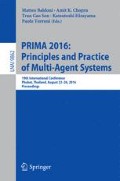Abstract
The VCG mechanism has many nice properties, and can be applied to a wide range of social decision problems. One problem of the VCG mechanism is that even though it is efficient, its social welfare (agents’ total utility considering payments) can be low due to high VCG payments. VCG redistribution mechanisms aim to resolve this by redistributing the VCG payments back to the agents. Competitive VCG redistribution mechanisms have been found for various resource allocation settings. However, there has been almost no success outside of the scope of allocation problems. This paper focuses on another fundamental model - the public project problem. In Naroditskiy et al. 2012, it was conjectured that competitive VCG redistribution mechanisms exist for the public project problem, and one competitive mechanism was proposed for the case of three agents (unfortunately, both the mechanism and the techniques behind it do not generalize to cases with more agents). In this paper, we propose a competitive mechanism for general numbers of agents, relying on new techniques.
Access this chapter
Tax calculation will be finalised at checkout
Purchases are for personal use only
Notes
- 1.
The VCG mechanism always picks the outcome that maximizes the agents’ total valuation.
- 2.
By social welfare, we mean the agents’ total utility: total valuation minus total payment.
- 3.
Even for n between 4 and 6, there is no guarantee of worst-case performance, because the worst-case is simulated via sampling, which may not be extensive enough.
- 4.
We do need the minor assumption that the number of agents is large compared to the number of items.
- 5.
If \(\sum _{j\ne i}\theta _j\ge \frac{n-1}{n}\), then pick \(\theta _i'=1\). Otherwise, pick \(\theta _i'=0\).
- 6.
This is called revenue monotonicity.
- 7.
The fourth term of E stays the same.
- 8.
Term one and three cancel out.
References
Cavallo, R.: Optimal decision-making with minimal waste: strategyproof redistribution of VCG payments. In: Proceedings of the International Conference on Autonomous Agents and Multi-agent Systems (AAMAS), pp. 882–889, Hakodate, Japan (2006)
Clarke, E.H.: Multipart pricing of public goods. Publ. Choice 11, 17–33 (1971)
Groves, T.: Incentives in teams. Econometrica 41, 617–631 (1973)
Gujar, S., Yadati, N.: Redistribution of VCG payments in assignment of heterogeneous objects. In: Papadimitriou, C., Zhang, S. (eds.) WINE 2008. LNCS, vol. 5385, pp. 438–445. Springer, Heidelberg (2008)
Guo, M.: VCG redistribution with gross substitutes. In: Proceedings of the National Conference on Artificial Intelligence (AAAI), San Francisco, CA, USA (2011)
Guo, M.: Worst-case optimal redistribution of VCG payments in heterogeneous-item auctions with unit demand. In: Proceedings of the Eleventh International Joint Conference on Autonomous Agents and Multi-Agent Systems (AAMAS), Valencia, Spain (2012)
Guo, M., Conitzer, V.: Worst-case optimal redistribution of VCG payments in multi-unit auctions. Games Econ. Behav. 67(1), 69–98 (2009)
Guo, M., Markakis, E., Apt, K.R., Conitzer, V.: Undominated groves mechanisms. J. Artif. Intell. Res. 46, 129–163 (2013)
Guo, M., Naroditskiy, V., Conitzer, V., Greenwald, A., Jennings, N.R.: Budget-balanced and nearly efficient randomized mechanisms: public goods and beyond. In: Chen, N., Elkind, E., Koutsoupias, E. (eds.) Internet and Network Economics. LNCS, vol. 7090, pp. 158–169. Springer, Heidelberg (2011)
Mas-Colell, A., Whinston, M., Green, J.R.: Microeconomic Theory. Oxford University Press, Oxford (1995)
Moore, J.: General Equilibrium and Welfare Economics: An Introduction. Springer, Berlin (2006)
Moulin, H.: Characterizations of the pivotal mechanism. J. Publ. Econ. 31(1), 53–78 (1986)
Moulin, H.: Almost budget-balanced VCG mechanisms to assign multiple objects. J. Econ. Theory 144(1), 96–119 (2009)
Naroditskiy, V., Guo, M., Dufton, L., Polukarov, M., Jennings, N.R.: Redistribution of VCG payments in public project problems. In: Goldberg, P.W. (ed.) WINE 2012. LNCS, vol. 7695, pp. 323–336. Springer, Heidelberg (2012)
Vickrey, W.: Counterspeculation, auctions, and competitive sealed tenders. J. Finance 16, 8–37 (1961)
Author information
Authors and Affiliations
Corresponding author
Editor information
Editors and Affiliations
Rights and permissions
Copyright information
© 2016 Springer International Publishing Switzerland
About this paper
Cite this paper
Guo, M. (2016). Competitive VCG Redistribution Mechanism for Public Project Problem. In: Baldoni, M., Chopra, A., Son, T., Hirayama, K., Torroni, P. (eds) PRIMA 2016: Principles and Practice of Multi-Agent Systems. PRIMA 2016. Lecture Notes in Computer Science(), vol 9862. Springer, Cham. https://doi.org/10.1007/978-3-319-44832-9_17
Download citation
DOI: https://doi.org/10.1007/978-3-319-44832-9_17
Published:
Publisher Name: Springer, Cham
Print ISBN: 978-3-319-44831-2
Online ISBN: 978-3-319-44832-9
eBook Packages: Computer ScienceComputer Science (R0)

